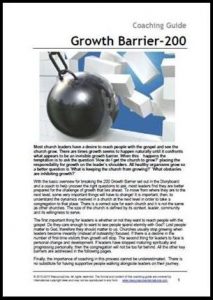Do you coach the leader of a small church? There are so many aspects to consider as a coach, when beginning to work with a pastor of a church; denomination, location, culture, the responses of the staff and congregation … but size of the church is maybe one of the most definitive factors.
Where Small Churches Excel

Like house churches, small churches grow through newcomers’ attraction to the relationships in the congregation. However, in the small church it can also be a personal relationship to the pastor that is the primary attraction for a new person. The pastor can begin two or three new ministries, classes, or groups, as long as he has secured the backing or participation of one key informal leader. Together they can begin a new activity that will bring many new people into the church.
—Tim Keller
A small church could have anywhere between 70 to 200 people.The majority of churches in the United States are in the 40-200 range. Three reasons this is so:
1. “Span of Care”
The solo pastor can comfortably lead and manage 40-200 people. Pastor’s who aren’t comfortable or knowledgable directing a staff tend to hit a growth barrier that keeps their church to a size they can shepherd on their own.
2. Facilities
Land and construction are expensive. The average church building can seat 200.
3. Growth Barriers
To break through the 70-120-200 growth barriers there are some changes in the way the leader operates that must be executed with intention and determination. Breaking through one growth barrer to the next requires a significant shift for the senior leader. Namely, instead of being the prime focus for all pastoral care, solo pastors learn to adapt and shift their behaviors to become a leader of leaders.
Coaching the Small Church Pastor
“Span of Care”
There exists varying views on the gift and role of a pastor. One end of the continuum is the “healer of the soul”… a doctor to care for the soul of people. On the other end of the continuum is the “leader of leaders” charged to win-build-send workers into the harvest. This profile might be a CEO or movement leader. Helping your client discern the type of leader they are, is one of the gifts you provide. Following are some questions to clarify their vision for the congregation they serve.
Key questions to ask a small church pastor about their vision:
- What is your vision for growth and reproduction?
- What are you doing well as a church?
- What can you prune to maximize what you are doing well?
- What do you need to change?
- How do you need to adapt?
- What are the most important things that you can do now that will have the greatest impact?
- What will you actually do?
Facilities
Help your client to capture a realistic picture of the resources the Lord has entrusted in their care. Facilities embody a myriad of messages to the community the church sends, consciously and subconsciously. Location is an obvious one. Imagine a church in the inner city vs. the suburbs vs. a space in a strip mall. What does this tell you about the church’s vision? Size, style, condition, etc. convey messages that people receive about the vision of the leader and congregation.
Key questions to ask a small church pastor about their facility:
- How well does your facility connect with the people you want to reach?
- What message does your building communicate?
- How can you accentuate the positive message?
- What can you change about the negative message your building communicates?
- How does the location of your facility help or hinder growth?
Growth Barriers
Epheshians 4:11-12 highlights the five giftings in the church: Apostles, Prophets, Evangelists, Shepherds, and Teachers (APEST). Apostles, prophets and evangelists tend to be strong on establishing churches vs. shepherds and teachers shine in their pastoral care and teaching roles, more more established works All five are necessary for health.
As leaders mobilize others in their APEST gifting it is important for the leader to adopt a coach approach so that they are able to multiply themselves to do the work of ministry. Releasing control by empowering others through coaching is key. As the leader does this, other leaders will adopt the same methodology as the pastor and will need to be trained in the essentials of coaching. This will ultimately create a culture of empowerment, expanding their circle of influence.
Key questions to ask a small church pastor about expanding their circle of influence
- What gifts are currently represented in your core leadership team?
- Which gifs are lacking or missing?
- Who is the Lord identifying that has these gifts?
- Who could you invite into your circle?
- How can you mobilize others in their gifting?
Breaking through the Small Church Barrier
To break through each barrier the leader must have a determined, intentional, pioneering outlook otherwise, the leadership will lose focus.
Birth pains will accompany each barrier as the congregation leans into a new way of being. There are negative connotations and challenges innate to the growth process. Here are some questions members might begin to ask:
- Does the pastor care?
- Is it all about growth?
- What about the good old days?
For some this is a natural and necessary transition. For others, it is not as natural and is more complicated. And still, others will have a more difficult time making the shift – and that is why you are so necessary to the small church pastor you coach.
Resources
Check out these coaching guides and storyboards to coach leaders through the following growth barriers:
Christian Coaching Essentials Cohort
- Are you new to coaching?
- Do you need to refresh your coaching process?
- Who do you know that needs to be trained?
- CLICK TO LEARN ABOUT THE ESSENTIALS COHORT
Cover Photo by John Cafazza on Unsplash
Photo by Priscilla Du Preez on Unsplash



